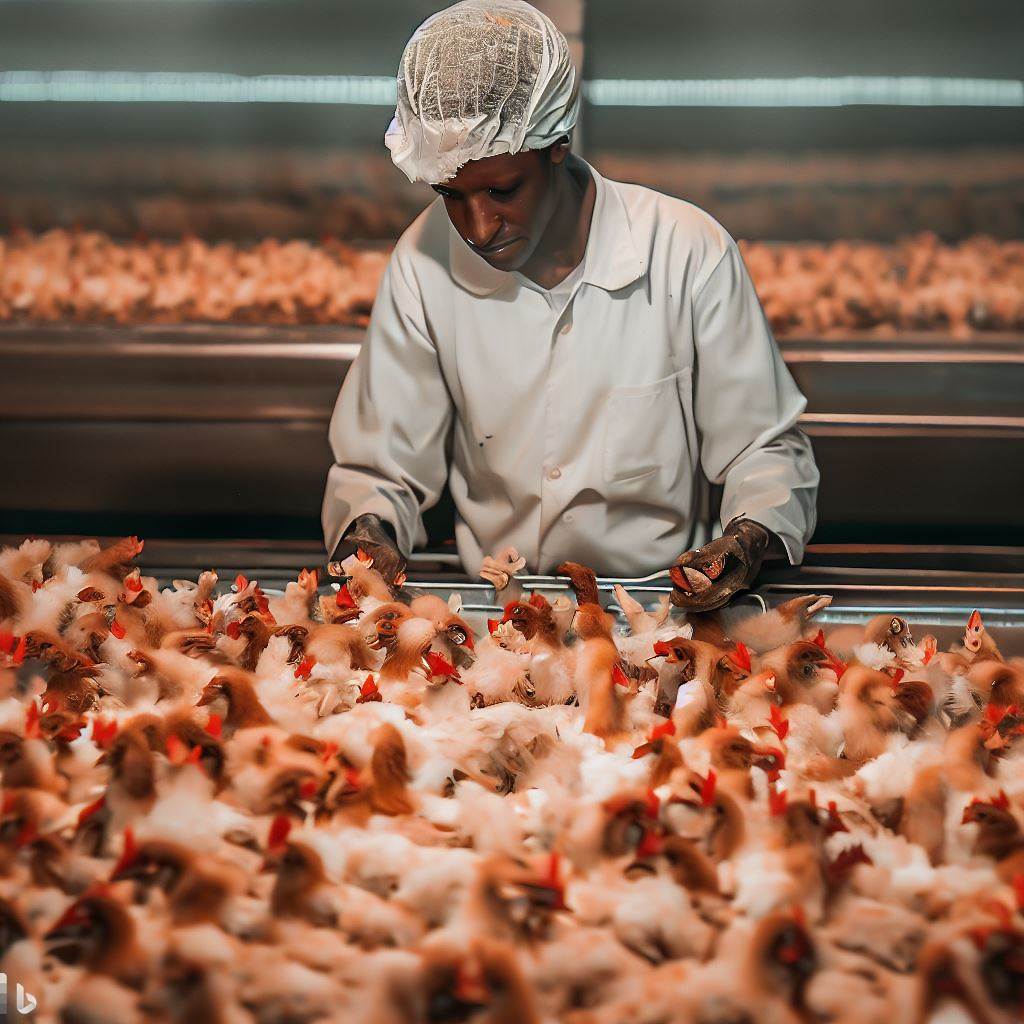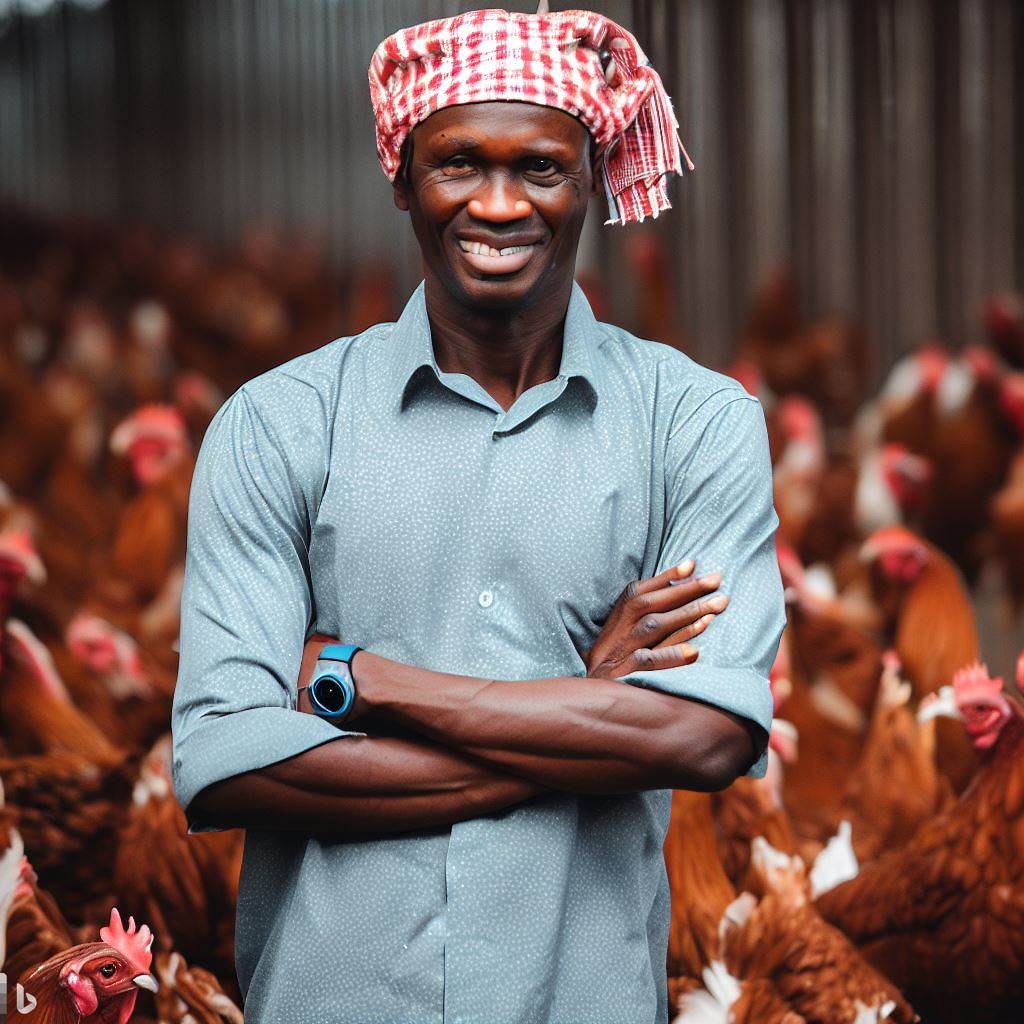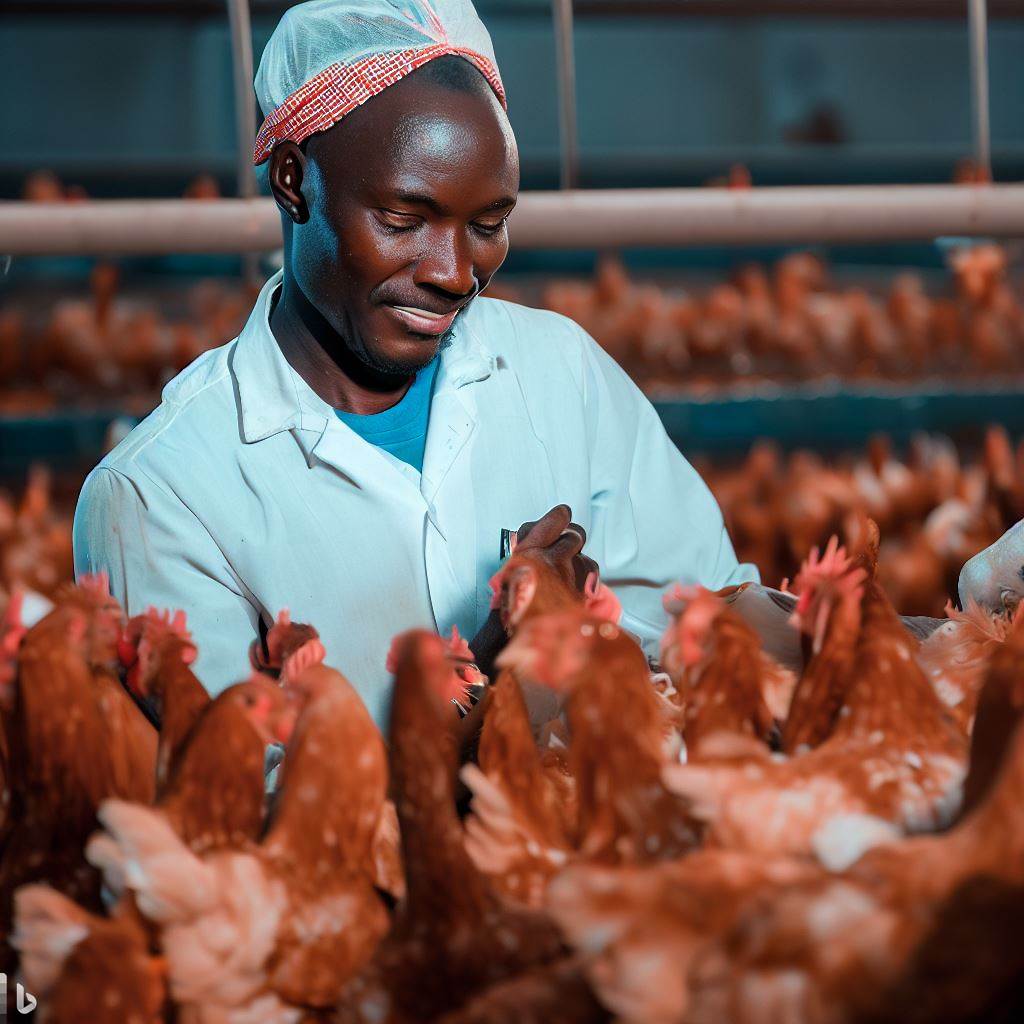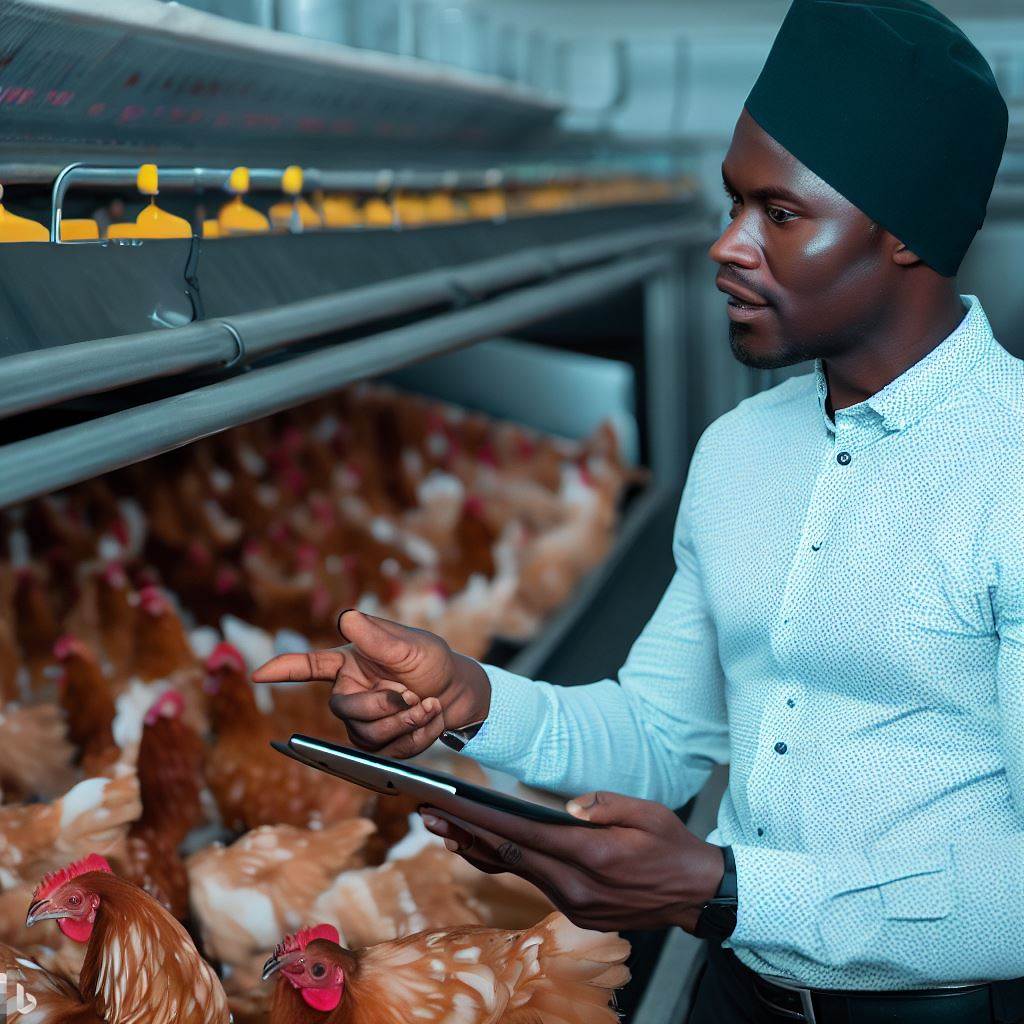Introduction
Gender equality refers to the concept of equal rights, opportunities, and treatment for both men and women.
It is a fundamental principle that should be upheld in all sectors, including Nigeria’s livestock industry. Promoting gender equality in this sector is crucial for several reasons.
Firstly, gender equality promotes social inclusion and fairness.
This means that both men and women should have equal access to resources, opportunities, and decision-making processes within the livestock sector.
By ensuring that women have equal rights and representation, a more diverse perspective can be achieved, leading to innovative solutions and improved performance in the industry.
Secondly, promoting gender equality in the livestock sector is essential for economic development. Women play a significant role in this sector, from animal rearing to marketing and processing.
However, they often face barriers such as limited access to credit, land, and training opportunities.
By addressing these barriers and providing equal support to both genders, the sector can unlock untapped potential and contribute to economic growth.
Furthermore, promoting gender equality in the livestock sector can also improve household food security and nutrition.
Women are usually responsible for managing household resources, including food.
By empowering and involving women in decision-making processes and providing them with equal opportunities, their skills and knowledge can be utilized to enhance productivity and address food insecurity challenges.
In fact, promoting gender equality in Nigeria’s livestock sector is vital for social inclusion, economic development, and food security.
By ensuring that both men and women have equal rights, access, and opportunities, the sector can thrive and contribute to a more sustainable and equitable society.
Current State of Gender Equality in Nigeria’s Livestock Sector
A. Statistics on gender representation in the sector:
- Women make up 70% of the labor force in Nigeria’s livestock sector.
- However, only 20% of women hold leadership positions within the sector.
- On average, women earn 30% less than men for similar roles in the livestock sector.
- There is a significant gender imbalance in both the ownership and management of livestock businesses.
B. Challenges faced by women in the livestock sector:
Gender disparities in Nigeria’s livestock sector stem from limited resource access, gender stereotypes, and inadequate support.
Women often lack education, training, and market access, impeding their engagement.
Transform Your Career in Nigeria
Discover unmatched expertise with our personalized Career Consulting service. Navigate Nigeria’s job market with a strategy tailored just for you.
Get StartedPolicy adjustments are vital:
- Leadership Representation: Enforce policies that elevate women to leadership roles.
- Education and Training: Invest in programs to empower women with livestock management skills.
- Resource Parity: Ensure equitable access to land, credit, and technology.
- Rural Support: Enhance infrastructure for women in rural areas participating in livestock activities.
- Market Access: Facilitate women’s entry to markets and networks, fueling business growth.
- Inclusive Decision-making: Incorporate women in livestock sector policies and decisions.
- Violence Mitigation: Tackle gender-based violence and discrimination via awareness and legal measures.
Addressing these challenges yields a more diverse, innovative sector with elevated productivity and profitability.
Women’s role enhances food security, trims poverty, and bolsters overall economic growth.
Collaboration among government, NGOs, and the private sector can build a sustainable, inclusive livestock industry, fostering shared prosperity.
Benefits of Gender Equality in the Livestock Sector
In the livestock sector, promoting gender equality brings numerous benefits that contribute to the overall development of Nigeria.
These benefits can be categorized into economic advantages, improved food security and livelihoods, and increased agricultural productivity.
A. Economic advantages
- Women’s participation in the livestock sector fosters economic growth and poverty reduction. By involving women in productive activities, household income is increased, and families are lifted out of poverty.
- Gender equality in the livestock sector ensures efficient resource allocation, leading to improved productivity and profitability.
When both men and women have access to resources and opportunities, they can contribute their skills and expertise, resulting in economic gains. - Women’s participation in decision-making processes within the livestock sector promotes better financial management.
By involving women in economic planning and budgeting, there is a higher likelihood of responsible financial practices, leading to sustainable economic growth. - Gender equality also enhances market development and trade. Women’s active involvement in livestock production and marketing increases supply, promotes competition, and attracts investments, therefore contributing to economic development.
B. Improved food security and livelihoods:
- Gender equality in the livestock sector strengthens food security by ensuring sustainable production and access to nutritious food.
When women are provided with equal opportunities to engage in livestock farming, there is an increase in the availability of animal-source foods, which are essential for a balanced diet. - Women play a crucial role in livestock-related activities, such as animal health and nutrition management.
When they are empowered and given access to knowledge and resources, they can contribute to the overall improvement of animal health, resulting in increased productivity and better food security. - Livestock farming is often an important source of livelihood for rural communities. Promoting gender equality in this sector leads to improved livelihoods for both men and women, as it ensures fair access to resources, markets, and income-generating opportunities.
- Gender equality in the livestock sector also addresses gender-based disparities in nutrition. When women are empowered economically, they can make better decisions regarding household food choices and allocate resources to meet nutritional needs, especially for women and children.
C. Increased agricultural productivity
- Gender equality promotes innovation and knowledge sharing in the livestock sector. When women have equal opportunities to access information, training, and technology, they can contribute innovative ideas and practices that enhance productivity.
- Women’s involvement in livestock production brings diverse perspectives and skills, leading to improved efficiency and productivity. Gender equality promotes the utilization of the entire human resource potential in the sector, resulting in better outcomes.
- Gender equality encourages sustainable and environmentally friendly practices. Women often possess valuable traditional knowledge related to sustainable resource management.
By involving them in decision-making processes, sustainable agricultural practices can be promoted, ensuring the long-term productivity of the livestock sector. - The inclusion of women in livestock value chains enhances market competitiveness. Women’s active participation in various stages of the value chains, including processing and marketing, leads to improved product quality, increased market share, and higher incomes for both men and women.
In essence, promoting gender equality in Nigeria’s livestock sector brings significant benefits.
These include economic advantages, improved food security and livelihoods, and increased agricultural productivity.
By acknowledging and addressing gender disparities, Nigeria can unlock the full potential of its livestock sector and work towards sustainable development.
Read: Roles and Responsibilities of an Agronomy Sales Manager
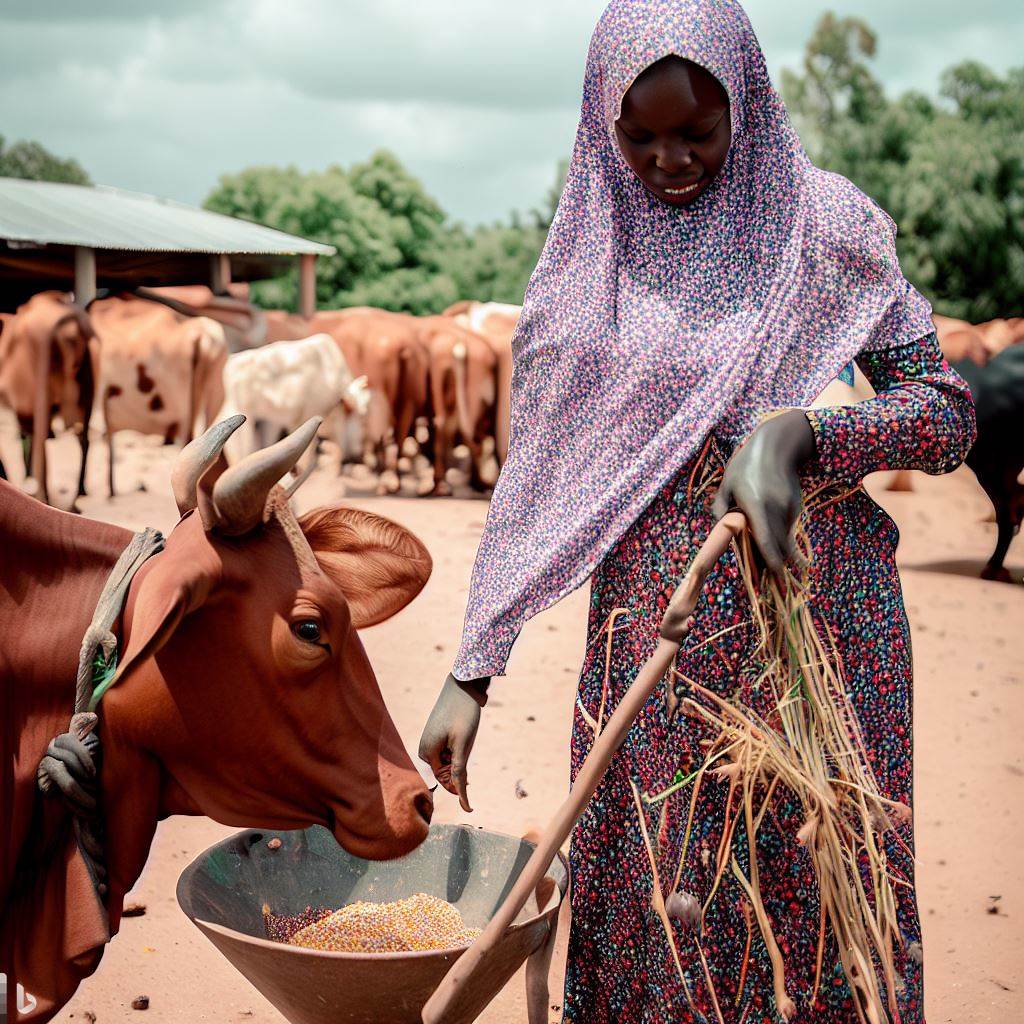
Strategies and Initiatives to Promote Gender Equality in Nigeria’s Livestock Sector
A. Encouraging women’s participation in decision-making processes
- Establishing gender-responsive policies and regulations that promote women’s involvement in decision-making.
- Creating platforms and forums where women can voice their opinions and contribute to decision-making.
- Encouraging women to participate in leadership positions within livestock-related organizations.
- Providing mentorship and guidance to women to build their confidence and skills in decision-making.
- Recognizing and celebrating the contributions of women in the livestock sector to inspire others.
B. Providing access to credit and resources
- Ensuring equal access to financial services, such as loans and grants, for women in the livestock sector.
- Establishing special funds or programs to support women’s entrepreneurship in livestock-related businesses.
- Creating partnerships with financial institutions to provide financial literacy training and mentorship for women.
- Offering subsidies or grants for women to access necessary resources and inputs for livestock farming.
- Establishing women-led cooperatives to pool resources and collectively access financial and technical support.
C. Enhancing women’s skills and knowledge through training programs
- Developing and implementing training programs that specifically target women in the livestock sector.
- Providing training on modern livestock farming techniques, animal health, and herd management.
- Offering business and entrepreneurship training to empower women in running profitable livestock enterprises.
- Encouraging women to participate in vocational and technical education programs related to the livestock sector.
- Organizing workshops and seminars to facilitate knowledge sharing and networking among women in the sector.
D. Increasing awareness and advocacy efforts for gender equality
- Conducting public awareness campaigns to challenge gender stereotypes and promote women’s contributions in the sector.
- Engaging with media outlets to feature success stories of women in the livestock sector.
- Collaborating with civil society organizations to advocate for gender-responsive policies and practices.
- Providing training to extension officers and agricultural professionals on gender-sensitive approaches.
- Establishing platforms for dialogue and knowledge exchange on gender equality in the livestock sector.
In short, promoting gender equality in Nigeria’s livestock sector requires a multi-faceted approach that addresses women’s participation in decision-making, access to credit and resources, skills enhancement, and awareness and advocacy efforts.
By implementing these strategies and initiatives, Nigeria can unlock the full potential of women in the livestock sector and drive sustainable development and economic growth.
Read: Career Path to Becoming an Agronomy Sales Manager
Successful Case Studies and Best Practices
A. Highlighting examples of organizations promoting gender equality in the sector
- Women in Agriculture Development Foundation (WADEF) empowers female livestock farmers through training and access to resources.
- Livestock Gender Equality Initiative (LGEI) provides financial support and mentorship opportunities to women in the livestock sector.
- Nigerian Women in Livestock Development (NWLD) promotes gender equality by advocating for women’s rights and representation in decision-making processes.
- Gender and Livestock Program (GLP) works towards creating an enabling environment for women in the livestock sector to thrive.
B. Discussing effective approaches and strategies employed
- Providing gender-focused training and capacity building programs to empower women in the livestock sector.
- Promoting women’s access to credit facilities and financial services to enhance their participation in livestock-related businesses.
- Creating platforms for women to share experiences, network, and collaborate with other stakeholders in the sector.
- Advocating for policy reforms that foster gender equality and ensure women’s inclusion in decision-making processes.
- Encouraging male champions who actively support gender equality and challenge traditional gender norms in the sector.
- Introducing gender-sensitive agricultural extension services that address the specific needs and challenges faced by women in livestock farming.
- Establishing gender-sensitive value chain systems that recognize and reward the contributions of women along the livestock value chain.
- Mainstreaming gender considerations in research and development efforts to ensure solutions are contextually relevant and inclusive.
- Engaging with traditional and religious leaders to address cultural barriers that hinder women’s participation in the livestock sector.
- Collaborating with government agencies and international organizations to leverage resources and support for gender equality initiatives.
Promoting Gender Equality in Nigeria’s livestock sector showcases effective strategies.
Your Unique Story, Perfectly Told
Don't let your dream job slip away with a generic resume. We craft personalized resumes and cover letters that highlight your unique strengths, making you unforgettable to Nigerian employers.
Get HiredOrganizations like WADEF, LGEI, NWLD, and GLP empower women through training, fostering skills for livestock farming.
Facilitating credit access helps expand their businesses. Networking platforms create collaboration, aiding learning and partnerships.
Advocacy for policy reforms addresses gender bias, involving traditional leaders. Male champions combat biases too. Tailored agricultural extension supports women’s roles.
Gender-responsive value chains recognize women’s livestock contributions, boosting visibility and economic prospects.
Inclusive research ensures relevant solutions. Collaboration with governments and global bodies amplifies impact.
These successes emphasize diverse avenues for gender equality promotion, fostering inclusivity and equity in the sector.
Read: Traits for Success in Agronomy Sales Management
Challenges and Possible Solutions
A. Identifying obstacles that hinder gender equality in the livestock sector
- Lack of access to resources such as land, credit, and inputs for women in the livestock sector.
- Cultural and social norms that limit women’s participation and decision-making power in the sector.
- Limited education and skills training opportunities for women in the livestock sector.
- Inadequate support and recognition for women’s contributions to the sector.
- Gender-based violence and discrimination faced by women working in the livestock sector.
B. Proposing solutions to overcome these challenges
- Ensure equal access to resources by providing targeted support and incentives for women in the livestock sector.
- Promote gender-sensitive policies and practices that value and include women’s participation and decision-making in the sector.
- Invest in education and skills training programs for women to enhance their capabilities and empower them in the livestock sector.
- Recognize and celebrate the contributions of women in the livestock sector through awards and public acknowledgments.
- Implement measures to address gender-based violence and discrimination through awareness campaigns, training, and legal frameworks.
Ensuring equal access to resources
One of the key challenges hindering gender equality in the livestock sector is the lack of access to resources, including land, credit, and inputs, for women.
To overcome this obstacle, targeted support programs can be introduced to provide women with equal opportunities in accessing these resources.
Additionally, incentives can be offered to encourage financial institutions and agricultural agencies to prioritize lending and support for women in the livestock sector.
Promoting gender-sensitive policies and practices
Cultural and social norms often limit women’s participation and decision-making power in the livestock sector.
To address this challenge, it is crucial to promote gender-sensitive policies and practices that value women’s contributions and include their perspectives in decision-making processes.
This can be achieved through gender mainstreaming efforts, ensuring that gender considerations are integrated into all policies and programs related to the livestock sector.
Investing in education and skills training
Another obstacle to gender equality in the livestock sector is the limited education and skills training opportunities for women.
Transform Your LinkedIn Presence
Don't let your LinkedIn profile blend into the crowd. We uniquely craft profiles that showcase your professional story, making Nigerian recruiters take notice like never before.
Stand OutTo overcome this challenge, it is essential to invest in educational programs and skills training that specifically target and empower women in the sector.
This can include vocational training, capacity building workshops, and scholarships for women to acquire the knowledge and skills needed to succeed in livestock-related professions.
Recognizing and celebrating women’s contributions
Women’s contributions to the livestock sector often go unrecognized and undervalued.
To address this issue, it is important to actively recognize and celebrate the achievements and contributions of women in the sector.
This can be done through awards, public acknowledgments, and highlighting successful women entrepreneurs and leaders in the livestock industry.
By promoting positive role models, more women can be encouraged to actively participate and excel in the sector.
Addressing gender-based violence and discrimination
Gender-based violence and discrimination are serious challenges faced by women working in the livestock sector.
To overcome this obstacle, it is crucial to implement measures that address and prevent such acts.
This can involve raising awareness about gender-based violence, providing training on gender equality, and establishing legal frameworks that protect women’s rights in the sector.
By fostering a safe and inclusive environment, more women will feel empowered to actively engage in livestock-related activities.
In a nutshell, promoting gender equality in Nigeria’s livestock sector requires addressing the obstacles that hinder women’s participation and empowerment.
By identifying the challenges and proposing solutions that focus on equal access to resources, gender-sensitive policies, education and skills training, recognition of women’s contributions, and addressing gender-based violence and discrimination, Nigeria can create an enabling environment for women to thrive in the livestock sector.
Read: The Impact of Agronomy Sales in Nigeria’s Economy
Conclusion
Promoting gender equality in Nigeria’s livestock sector is of utmost importance. Gender disparities have long hindered the sector’s potential for growth and development.
By ensuring equal opportunities for both men and women, the sector can benefit from the diverse skills, knowledge, and expertise that both genders bring.
Women, in particular, play a vital role in livestock farming and are key contributors to the sector’s success.
Efforts towards achieving gender equality in the sector must be supported and encouraged.
This includes providing access to education and training for women, promoting women’s leadership and decision-making roles, and addressing cultural and societal norms that perpetuate gender inequalities.
Additionally, policies and programs that focus on women empowerment and creating a conducive environment for their participation in the sector should be implemented.
By prioritizing gender equality, Nigeria’s livestock sector can become more inclusive, productive, and sustainable.
Women will have the opportunity to contribute their skills and knowledge, access resources and markets, and ultimately, improve their livelihoods.
It is only through collective efforts and a commitment to promoting gender equality that the sector can reach its full potential and contribute to Nigeria’s overall economic growth and development.

